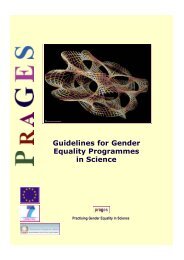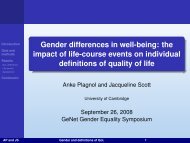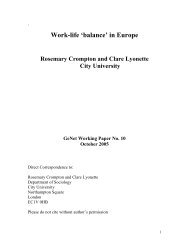Job insecurity, gender and work orientation: an exploratory ... - GeNet
Job insecurity, gender and work orientation: an exploratory ... - GeNet
Job insecurity, gender and work orientation: an exploratory ... - GeNet
Create successful ePaper yourself
Turn your PDF publications into a flip-book with our unique Google optimized e-Paper software.
<strong>Job</strong> <strong>insecurity</strong>, <strong>gender</strong> <strong><strong>an</strong>d</strong> <strong>work</strong> <strong>orientation</strong>: <strong>an</strong> <strong>exploratory</strong> study of breadwinning<br />
<strong><strong>an</strong>d</strong> caregiving identity<br />
J<strong>an</strong>e Nol<strong>an</strong><br />
Abstract<br />
A grounded theory approach is used to explore the relationship between job <strong>insecurity</strong>,<br />
<strong>gender</strong> <strong><strong>an</strong>d</strong> <strong>work</strong> <strong>orientation</strong>. <strong>Job</strong> <strong>insecurity</strong> is useful for exploring the concept of <strong>work</strong><br />
<strong>orientation</strong> because it has been hypothesised that the possibility of job loss may be<br />
experienced by some men as a threat to their breadwinning identity. Drawing on in-depth<br />
interviews with 28 particip<strong>an</strong>ts, the paper develops a conceptual frame<strong>work</strong> based on the<br />
studies of Hakim (2000) <strong><strong>an</strong>d</strong> Crompton <strong><strong>an</strong>d</strong> Harris (1999) to explore the themes of<br />
<strong>gender</strong>ed choice <strong><strong>an</strong>d</strong> constraint in relation to <strong>work</strong> <strong>orientation</strong>. Results show that both<br />
Hakim <strong><strong>an</strong>d</strong> Crompton <strong><strong>an</strong>d</strong> Harris have generated descriptively me<strong>an</strong>ingful concepts <strong><strong>an</strong>d</strong><br />
that the polarisation of this debate into voluntarist <strong><strong>an</strong>d</strong> constructionist camps is not<br />
helpful. Furthermore, the paper argues that there is a need for contemporary conceptual<br />
<strong><strong>an</strong>d</strong> empirical research on men’s <strong>work</strong> <strong>orientation</strong>s.<br />
Introduction<br />
In the last 30 years, there has been interesting, if somewhat sporadic, research<br />
which shows that <strong>work</strong> <strong>orientation</strong> influences the experience of job <strong>insecurity</strong>. Research<br />
carried out after the 1930s depression in the USA suggested that men who were rigid <strong><strong>an</strong>d</strong><br />
traditional in their outlook on divisions of labour were more likely to experience marital<br />
breakdown in conditions of job <strong>insecurity</strong>, economic uncertainty <strong><strong>an</strong>d</strong> unemployment<br />
(Liker <strong><strong>an</strong>d</strong> Elder 1983). Voyd<strong>an</strong>off <strong><strong>an</strong>d</strong> Donnelly (1988) surveyed married people from<br />
Dayton, Ohio <strong><strong>an</strong>d</strong> found that husb<strong><strong>an</strong>d</strong>s experiencing job <strong>insecurity</strong> indicated a decrease in<br />
marital satisfaction associated with the adoption by their wife or children of 'breadwinning<br />
roles'. Burchell (1994) compared the General Health Questionnaire scores of<br />
men <strong><strong>an</strong>d</strong> women in the UK who became insecurely employed after a period of<br />
unemployment. In short, he found that the security of the new job was more import<strong>an</strong>t,<br />
2






